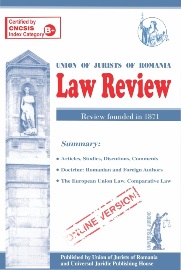ASPECTS OF COOPERATION BETWEEN THE PARLIAMENT AND THE GOVERNMENT REGARDING EUROPEAN AFFAIRS
ASPECTS OF COOPERATION BETWEEN THE PARLIAMENT AND THE GOVERNMENT REGARDING EUROPEAN AFFAIRS
Author(s): Dragoș-Adrian BANTAȘSubject(s): Law, Constitution, Jurisprudence, Civil Law, Governance, Economic policy, EU-Approach / EU-Accession / EU-Development, EU-Legislation
Published by: Universul Juridic
Keywords: European Union; Parliament; Council; Member States; cooperation; Government; position; vote; parliamentary control; European affairs; subsidiarity;
Summary/Abstract: The unique creation in the history of the relationships between states, the European Union is an innovative construction whose structure is based on a number of institutions representing, as the case may be, the interests of the citizens of the European Union, of the Member States and of the Union itself, all of wich are involved in the decision-making process at the Union's level. The positions of the States that are expressed in the representative institutions are carried out after certain internal procedures, which are capable of offering a legal and legitimate nature, from a democratic point of view. Also, in the exercise of parliamentary supervision over European affairs, national parliaments are becoming a link in a complex institutional chain; these elements, in fact, are the subject of our study. In order to accomplish this, we propose to use the analysis of the primary sources, more specifically to identify the primary sources of European Union law (TEU, TFEU and its Protocols), as well as national legislation or the case-law of the CJEU. Last but not least, we will refer to the doctrine to critically interpret the legal framework identified.
Journal: Law Review
- Issue Year: 2017
- Issue No: Supliment2
- Page Range: 187-199
- Page Count: 13
- Language: English
- Content File-PDF

